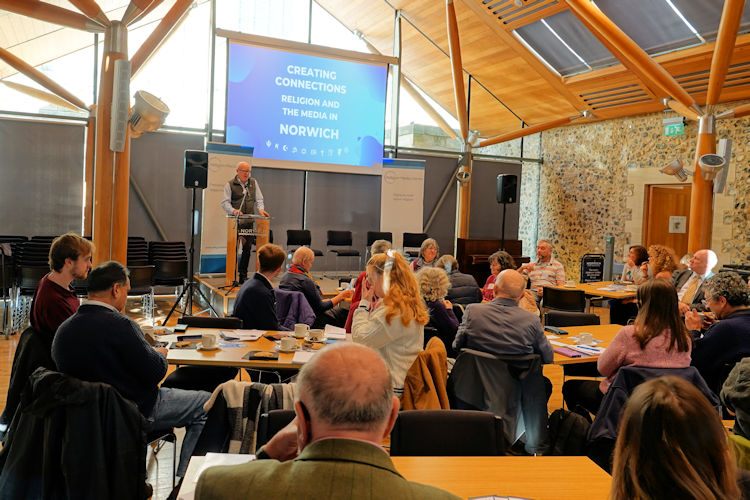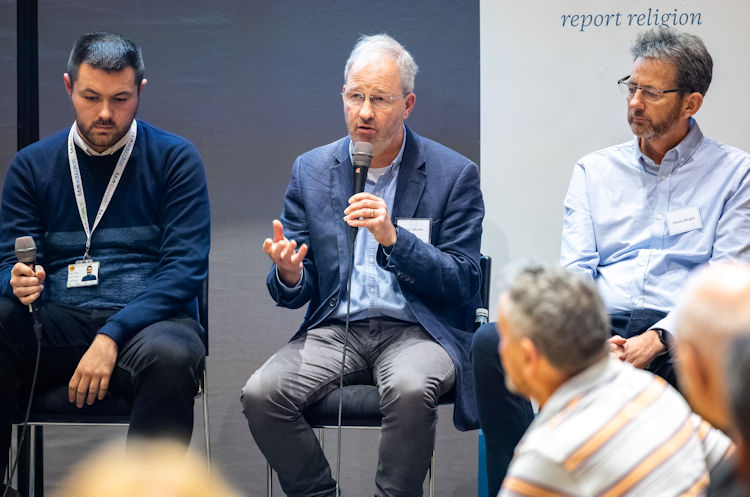
Creating media and faith connections in Norwich
Creating connections and a better understanding between the local media and faith communities in Norwich was the aim of the Religion Media Centre organized Creating Connections Conference at Norwich Cathedral yesterday (November 30).
An audience of around 60 from all of the local faith communities, heard RMC executive chair Michael Wakelin introduce the day.
Former BBC Radio Norfolk broadcaster Tony Mallion gave an insightful view of the local media landscape comprising TV and radio stations, daily and weekly newspapers and independent Christian news website Network Norfolk – “an exceptional digital Christian news service”, said Tony.
“The media has changed but, although fragmented, the opportunities are still there for the local faith communities. The challenge is to find out what is there and which ones will reach the audiences you want to engage with.
“Despite the changes in technology and the bewildering and ever-increasing media outlets, the media still thrives on the one thing that never changes – your stories. You’ve got them and they want them – it is as simple as that,” said Tony.
Dean of Norwich Cathedral, Very Rev Andrew Braddock, gave an overview of the religious landscape in Norwich, dubbed in the 2011 Census as the “least religious city in the country” with 42% having No Religion (up to 53% in 2021).
Dr Braddock went on to partly dismantle the figures which still said that 45% of people were Christian (down to 34% in 2021), totalling almost 60,000 people, compared to a mere 131 Atheists, 61 Humanists, along with 12 Druids and 10 Heathens, all vastly outnumbered by the 783 Jedi Knights.
Dr Braddock went on to say that the religious nature of Norwich went way beyond the bare statistics, encompassing the city’s very identity and the deep-rooted engagement and influence of the local faith communities in the city.
Attendance at Anglican services in Norwich, according to 2019 figures, stand at 2% — just shy of the national figure of 2.2%. Dr Braddock said there was a significant growth in evangelical churches in Norwich, and he highlighted the social action of numerous faith groups, saying that the number of working hours clocked up by volunteers was 20% higher than the national average.
The cathedral was all-important to the city’s identity, said the dean: “We are the largest visitor attraction in Norfolk and Norwich by some way,” he said. “There’s a strong sense of relationship between the cathedral and the civic life of the city. I think we are pretty religious in spite of what the headlines might say in some newspapers.”
A panel of third-year broadcast and multimedia journalism students from the University of East Anglia then spoke to the conference. Introduced by their lecturer Barnie Choudhury, a former BBC journalist and editor-at-large and columnist at Eastern Eye, the group screened a series of TikTok videos they had made on religion for the event. They covered the Census “no religion” question, the Quaker community in Norwich, the Norwich Buddhist Centre, the story of the increasing number of Muslim converts in Britain and the small Jewish community of West Norfolk who regularly meet in people’s houses because the nearest synagogue is 40 miles away.
The Rt Rev Peter Collins, Bishop of East Anglia, briefly gave his thoughts on the importance of communication and religion and the media and said he was a part of bodies creating dialogue with both the Anglican Church and other faith communities.
Former BBC faith producer Kirsteen Thorne, then hosted a panel of media professionals. The aim was to introduce the local media to the city’s faith and community groups and to build a better understanding of how they can co-operate.
Ian Clarke, executive editor of the Eastern Daily Press, said much had changed since he started work in the industry in the 1980s, but added: “The way that we tell news is very different but the number of eyeballs that are on stories that we read and pictures that we take is probably more than when I first started.”
Everyone on the panel agreed that communicating about people was vital to storytelling. Robert Thompson, editor of BBC East, said: “In the heart of every journalist they want to make a connection with the story and the interviewee who is telling that story because that is what turns it into a great story. For all of us it’s about how we build those connections.”
When questioned about the lack of trust that some may have in journalists, Simon Wright, Anglia TV’s programme and digital editor, said: “We all live and work in this community. There’s no great benefit to us in getting things wrong and sensationalising things. We are all regulated, but more importantly we are all dependent on our viewers who are people in this region.”
Keith Morris, director of communications for the Catholic Diocese of East Anglia and publisher at Christian news website Network Norfolk, said that while his website’s audience was smaller than the media giants, his reporters were in closer contact with them and provided “inspiring and engaging” content for readers. In particular, they were able to focus on faith stories, he added.
Dean Tucker, manager of Future Radio, a community station based in Norwich, said its focus was on music, but “we are all about giving people a voice, certainly people who wouldn’t necessarily get their voice heard anywhere else”.
The panel was followed by a time of networking amongst participants and media representatives.
Afterwards Michael Wakelin said: “After all the other cities we have visited Norwich was the climax to our Creating Connections project. With all the lessons learnt from other venues we feel we got this one just about right – the best in the series. This is thanks largely to the wonderful cooperation and support we received in setting up the event and the quality of the participants on the day. We have had excellent feedback and shall look forward to following up with you.
“The conference was such a successful event. It really couldn’t have gone any better. My RMC colleagues were all of the same opinion that this is the best one we have ever done.”
Article extracts from the RMC
Pictured top is the Creating Connections conference at Norwich Cathedral and, below, the media panel, including Network Norfolk editor Keith Morris centre, facing questions from the floor. Pictures by Network Norfolk and the RMC.
